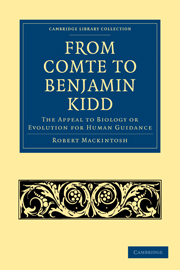Book contents
- Frontmatter
- PREFACE
- Contents
- CHAPTER I INTRODUCTORY
- PART I COMTISM, WITH SOME SCATTERED PARALLELS
- CHAPTER II COMTE'S LIFE AND THE PRINCIPLES OF HIS TEACHING
- CHAPTER III THE APPEAL TO BIOLOGY
- CHAPTER IV THE APPEAL TO HISTORY
- CHAPTER V THE DOCTRINE OF ALTRUISM
- CHAPTER VI COMTE'S LAWGIVING
- PART II SIMPLE EVOLUTIONISM—SPENCER, STEPHEN
- PART III DARWINISM, OR STRUGGLE FOR EXISTENCE
- PART IV HYPER-DARWINISM—WEISMANN, KIDD
- Index
CHAPTER V - THE DOCTRINE OF ALTRUISM
Published online by Cambridge University Press: 29 August 2010
- Frontmatter
- PREFACE
- Contents
- CHAPTER I INTRODUCTORY
- PART I COMTISM, WITH SOME SCATTERED PARALLELS
- CHAPTER II COMTE'S LIFE AND THE PRINCIPLES OF HIS TEACHING
- CHAPTER III THE APPEAL TO BIOLOGY
- CHAPTER IV THE APPEAL TO HISTORY
- CHAPTER V THE DOCTRINE OF ALTRUISM
- CHAPTER VI COMTE'S LAWGIVING
- PART II SIMPLE EVOLUTIONISM—SPENCER, STEPHEN
- PART III DARWINISM, OR STRUGGLE FOR EXISTENCE
- PART IV HYPER-DARWINISM—WEISMANN, KIDD
- Index
Summary
A third practical or moral authority is found by Comte in the doctrine of Altruism. Vivre pour autrui is to be our constant inspiration and our shining goal. This is really a fragment of that ethical portion of his system which Comte did not live to work out. The definition of Altruism is never formulated; it is never supported in argument; it is merely taken for granted. None the less it exerts an immense influence in Comte's own system, and has spread from it far and wide. Innumerable writers, Christian as well as non-Christian, have come to employ the term “Altruism” as a synonym for goodness. Such assumptions demand our scrutiny.
The doctrine has at least two aspects, a psychological and an ethical. Psychologically, it is assumed that human motives fall into two classes; one class terminating on the self, and seeking one's own private good; the second class terminating upon others, and seeking their good. It is further assumed that the division of motives into these two classes is exact and exhaustive. The two classes in question nowhere overlap, and there is no third class of motives. Every action must be done with a view either to our own good or to the good of another, or some others, or all others. A further assumption is noteworthy, both psychologically and ethically.
- Type
- Chapter
- Information
- From Comte to Benjamin KiddThe Appeal to Biology or Evolution for Human Guidance, pp. 45 - 54Publisher: Cambridge University PressPrint publication year: 2009First published in: 1899



